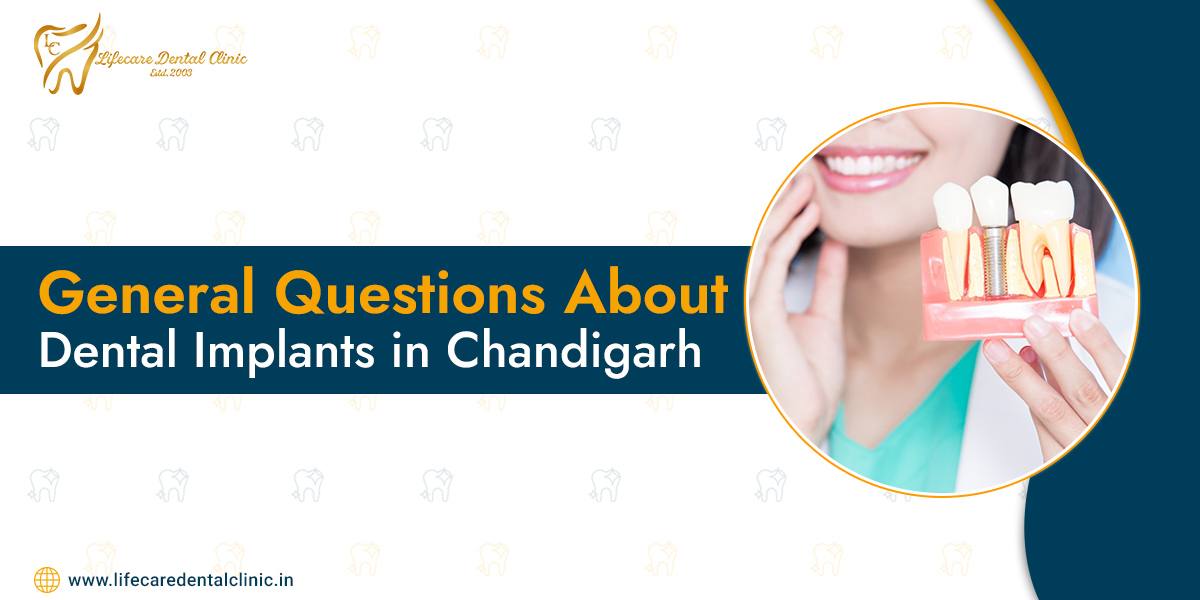General Questions About Dental Implants in Chandigarh

Published Date: July 09, 2024 Last Update: September 27, 2024
Author: Dr. Manpreet S. Walia
Dental implants have become a popular choice for replacing missing tooth or teeth, and offer a natural-looking and long-lasting solution. But with any dental procedure, many doubts or questions may arise. This blog aims to address some of the most common queries that patients ask regarding dental implants.
Top 10 General Questions About Dental Implants in Chandigarh
1. Is it painful to get a dental implant?
Ans: The procedure of a dental implant is not that painful as it involves anesthesia, so you don’t feel much pain during the placement of the implant. There might be some discomfort afterwards, which can be managed with medication.
2. What are the 3 types of dental implants?
Ans: The most common types of dental implants are:
-
Endosteal implants
Endosteal implants are surgically placed in the jawbone providing a sturdy foundation for artificial teeth.
-
Subperiosteal implants
In subperiosteal implants, the implants are placed on top of the jawbone, suitable for patients with thin jawbones.
-
Zygomatic implants
Zygomatic implants are usually used in the upper jawbone of the patients who suffer from severe bone loss.
3. Can a dental implant get infected?
Ans: Yes, like any surgical procedure, a dental implant can also get infected if proper care is not given. Proper aftercare is needed to significantly reduce the risk of dental implant infection.
Following are some steps that you can take to reduce the risk of a dental implant infection:
-
Maintain good oral hygiene
Brushing twice a day with a soft-bristled brush and flossing daily around the implant is essential.
-
Rinse regularly
Use mouthwash or a saltwater solution to rinse your mouth once or twice a day. This helps control bacteria buildup.
-
Visit your dentist clinic regularly
Schedule checkups and cleanings with your dentist to monitor your implant health and identify any potential issues early on.
-
Avoid smoking
Smoking weakens the immune system and can hinder the healing process, increasing the risk of infection.
-
Diet
Limit sugary foods and drinks that promote bacterial growth.
If you've recently had implant surgery, follow your dentist's post-operative instructions which include specific cleaning recommendations and things to avoid during healing. Remember, these tips are for prevention. But if you already suffered from implant infection (symptoms include redness, swelling, pain, or pus around the implant), see your dentist immediately. They can diagnose the infection and recommend the appropriate treatment.
Read This Article - Dental Procedure Options for Missing Tooth Replacement in Tricity
4. Are implants permanent? How long does a dental implant last?
Ans: Dental implants are very durable and can successfully last a lifetime with proper care. Factors like oral hygiene, underlying health conditions, and biting habits can influence their longevity. However, the crown or bridge attached to the implant may need to be replaced over time due to wear and tear.
5. How many teeth can you have on implants?
Ans: The number of implants needed depends on the number of teeth being replaced and the jawbone condition. You don't necessarily need one implant per missing tooth. Implants can support a single crown for a single tooth, bridges for multiple teeth, or even dentures for an entire arch. For example, for replacing 3 teeth, depending on the situation, you might only need 2 implants with a bridge spanning the gap. A dentist will assess your specific situation and determine the optimal implant placement.
6. Do dental implants feel natural?
Ans: Yes, dental implants feel and look natural. Once the dental implant is healed, it fuses with the jawbone, providing a stable foundation for the crown or bridge.
7. Do dental implants get cavities?
Ans: No, the implant itself is made of titanium and cannot get cavities. However, proper oral hygiene is still crucial to prevent gum disease around the implant.
8. Can you get gum disease with implants?
Ans: Yes, peri-implantitis which is a form of gum disease can affect implants. Peri-implantitis is basically an inflammatory process that affects both soft(flesh) and hard(bone) tissues surrounding dental implants. Maintaining good oral hygiene and regular dental visits are essential in order to prevent this gum disease.
9. Why does your dental implant hurt when you chew?
Ans: Pain during chewing could indicate several things, such as excessive pressure on the implant, inflammation, or loose crown. It's important to consult with your dentist for diagnosis and treatment.
10. Can implants fail years later?
Ans: Yes, it can. However, an implant can rarely fail years later due to infection, overloading, or other factors. In order to save your dental implant, regular dental checkups are needed to help detect potential issues early on.
Conclusion
In conclusion, dental implants in Chandigarh can be a transformative solution for restoring your smile and overall well-being. Dental implants offer a natural look, improved functionality, and long-lasting durability when compared to other tooth replacement options. While the cost of a dental implant can be a little expensive but remember that quality shouldn't be compromised in this treatment. So, if you have cleared all your doubts or queries and ready to take the first step towards a healthier, more confident you, schedule a consultation with our best dental implant specialist in Chandigarh today!

Leave A Reply